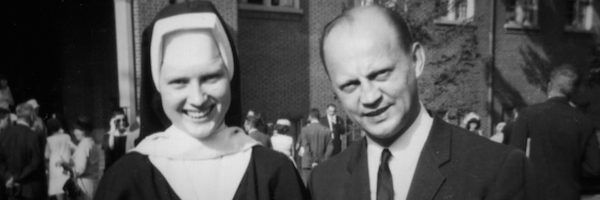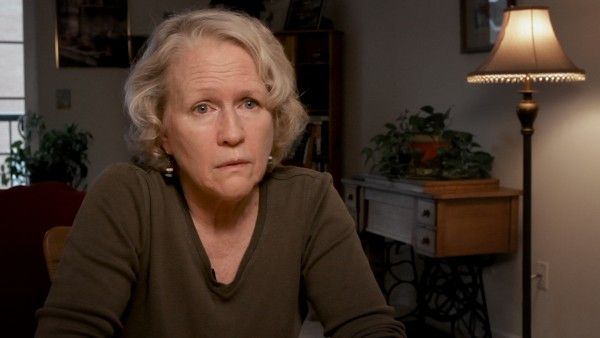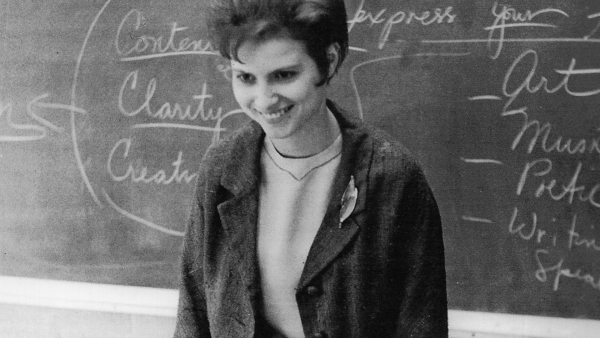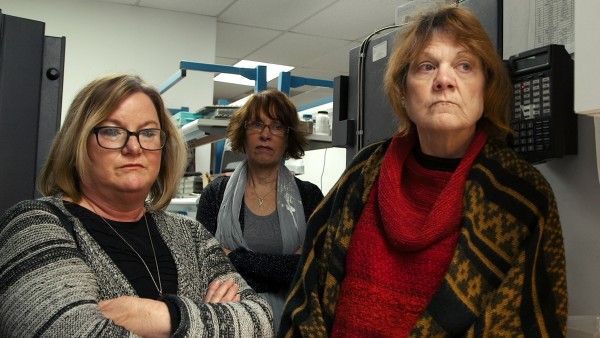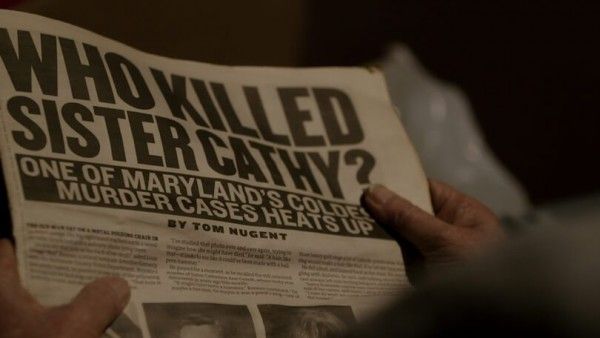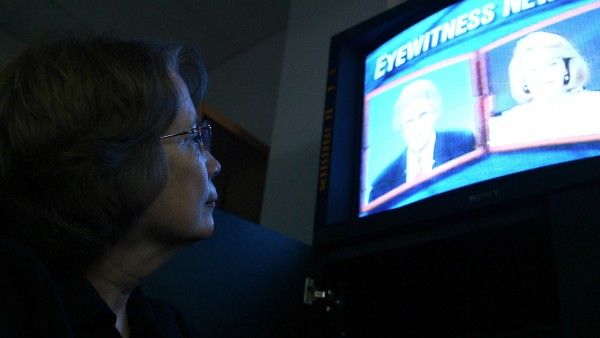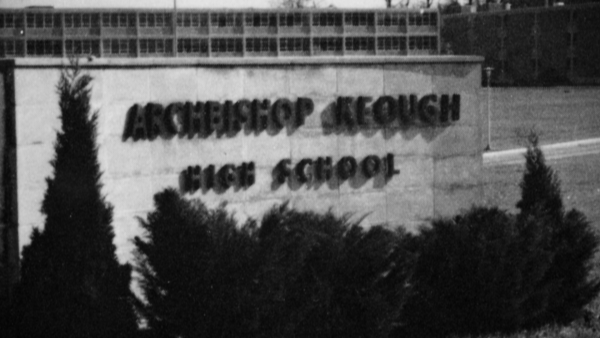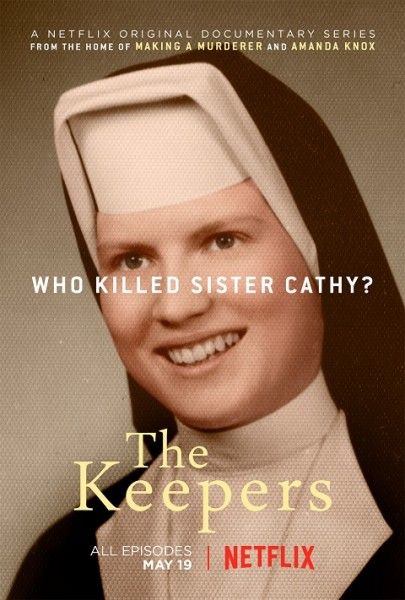The true crime “docuseries” format is a relatively new phenomenon, but one that’s seen great success with watercooler shows like The Jinx and Making a Murderer. Netflix recently went all in on a new docuseries, The Keepers, which chronicles the murder of a nun in 1969 Baltimore, but what sets The Keepers apart from these others shows is its emotional core. While the series does indeed delve into the murder of Sister Cathy Cesnick, there’s an even more sinister undercurrent having to do with systemic sexual abuse by a Catholic priest at an all-girls school.
Throughout the series, director Ryan White maintains a laser focus on the survivors of this abuse, allowing them to tell their stories—no longer silenced. It makes The Keepers all the more emotionally involving and, in the end, long-lasting. It’s not a thrilling yet fleeting walk through a crime story. It’s a complex web of abuse that occurred and was allowed to occur by those in power, and one that’s taken years to fully uncover.
I recently got the chance to speak with White about the series. We discussed how he first became involved with this story, the evolution of its focus as time went on, aspects of the story that were left out of the finished series, and trying to keep everything together as the story got more and more convoluted. Given that there are so many unanswered questions we also addressed some theories regarding certain events and discussed the recent revelations having to do with Father Maskell as Baltimore continues to investigate Sister Cathy’s murder. It’s a wide-ranging interview that hopefully provides some insight into what it was like to bring this show to life, and the emotional impact that these stories had on White himself.
Check out the full interview below. All seven episodes of The Keepers are available to stream on Netflix now.
The Keepers unfolds quite deliberately, beginning as seemingly another murder mystery, but then folding in this larger issue of the systemic abuse. I was curious, when you began and started to take this on, how much of the story did you already know?
RYAN WHITE: Virtually nothing. I wasn't prepared at all for what The Keepers became. I began with a personal connection that I had when my aunt went to this high school and was Sister Cathy's student. So she was around during the time, but I had never heard the story of one of her teachers going missing and being found dead. But a few years ago, my aunt and my mom found out who Jane Doe was, and it turned out that it was a friend of theirs that they had grown up with. They were shocked by that. They had no idea that Jean was Jane Doe or had lived through such horror and trauma. They connected me with Jean. So I flew out to Baltimore and met her, and then it was a many month process of her deciding if she wanted to do this. So it wasn't even—I had no plan. I didn't know that there was a whole story that lies beneath, and I had no idea that I was going to end up making a seven-part series. I was just flying out to meet my aunt and my mom's friend, and it just kind of ... snowballed is not the right word. It's far larger than that, but it just became something so much darker and deeper and larger than I ever thought it was gonna be.
How quickly did you know it was a series and not a traditional feature documentary?
WHITE: Not quickly because the first time I went to Baltimore to meet Jean was the month before Serial came out. Then that became a thing. And then The Jinx came out, I think one year into us making it. And then Making a Murderer came out later that year. So I thought, at the most, we were going to be making a feature-length documentary, and then this format started developing at the time. And people were actually tuning in to watch documentaries that were multiple parts. So that's when I started, when I saw the success of those, and I knew I had way too big of a story to tell in 90 minutes. So I had to really figure out which part of it I was going to tell. That was when it dawned on my producer, Jeff, and I. Let's start kicking this out as a potential series, and we got interest across the board. I think The Jinx and Making a Murderer were so successful that people recognized that there was an audience for those, and the distributors who were interested in those all really liked the idea of The Keepers.
Yeah. I can't even imagine concisely telling this in two hours.
WHITE: No, this wouldn't have been. It wouldn't have been wholly representative. We would have had to chosen an angle. I've never really thought of what that would have been. It probably would have been Jean's story. But luckily, Netflix was very open to the idea of telling a long format.
Well, Jean's story is very much the heart of the series, and what I found really refreshing about the show is that it is something of a murder mystery, and that aspect is definitely covered, but it evolves into something much more emotional and powerful as you give a voice to these abuse survivors who were silenced for so long. Stuff like The Jinx and Making a Murderer are really fascinating and interesting, but I just felt like that focus on the emotion and the power of their stories really came through. Did you feel that evolution as you were making the show?
WHITE: Yeah, well, I knew it was going to be different than those other true crime series because of that, and I also knew that that was a risk. Because for whatever reason, people love murder mysteries. Even when they're non-fiction, they love the idea of that. But people don't love looking at or talking about child sex abuse. So I knew the odds were stacked against us to have the type of frenzy that those other series had. I have to hand it to Netflix, too, because I never felt any pressure to stay in a true-crime aisle. They were very supportive of me continuing to tell that more emotional, human side of it, I would say, that isn't as ... The feed for the audience in an investigative way is actually really painful to watch. So that was a big part of the editing process, and I had wonderful editors, many of whom I'd already worked with before, but I had three full-time editors, three assistant editors, and there were constant conversations of, like, how do we balance this? We know we want people coming back for each episode, and we know that the murder's going to keep them coming back and all the answers that they're getting for that. But how do we also make them understand what led us to the murder, which is the far darker crime, and make them watch it without tuning out? So it's interesting to watch, right now, all the reactions to the series because I'm very curious how people are actually consuming it and whether they're sticking with it. I've noticed from social media this resounding emotion. People say it's painful to watch, and people say they're angry at the end.
Yeah.
WHITE: That's kind of my very rudimentary metric for how I'm measuring the reaction to this.
Yeah. My girlfriend and I binged it over Memorial Day weekend, and it's not something that's easy—you're excited to go back and watch it, but it's not something that's easy to watch, but it feels like there's so much in each episode that's unfolding that when you get to Jean's “Those fuckers” line you're kind of saying that as well. She's speaking for you, the viewer, when this revelation comes out.
WHITE: Yeah. It's a wonderful line, and I've seen some gifs going online about it. I just sent it to her just as a joke. Jean never uses bad language, and I said just so you know, this is going viral.
Did you imagine you were making a gif-able docuseries?
WHITE: (Laughs) No, no idea. The gifs I never considered.
Well I really appreciated the fact that the last episode is dedicated to these survivors, but I was curious, did you feel any pressure either external or internal to conclude in a manner that fingered one specific person for Cathy's murder?
WHITE: No, because I would've felt irresponsible doing that because I can't point at one person. So I, from the very beginning, I always had the mantra of, we're not out to solve a murder. This murder is so old, and the evidence, stories around it had been deliberately buried that ... the point of The Keepers is not to solve the murder. Now that we're at the finish line, and we've seen so much movement in the past month, since the trailer came out especially since the series came out, that I fully believe that the murder can still be solved, but I knew we were never gonna have a Jinx ending, where I was gonna end up with a hot mic and someone saying they killed Sister Cathy. It just wasn't gonna happen, and I was always okay with that. There were more interesting layers to her death that I was interested in telling, and hopefully some of those are answered in the series, and I love Marilyn so much, she's Sister Cathy's sister, and I want her to get answers, and if the exposure of the documentary can help lead to some of those answers, then I'll be thrilled, but that wasn't, to me, the journey of The Keepers, the story that I was telling wasn’t to point a finger at the end.
The episode that covers the Edgar and Billy theories is an interesting one. When you conducted those interviews and gather all of this information, how daunting was it to try to piece all that together in a manner that was coherent, even though these would appear to be mutually exclusive theories or stories? Cause my head was kind of spinning as I was watching and getting all this information, so I can only imagine what you were going through in collecting all of this.
WHITE: Yeah, no my head's still spinning, trying to distill it all. I was really fascinated though, from the very beginning of making The Keepers when we would visit Baltimore and it was just my producer and I, and my producer Jeff and I have been best friends since we were little kids, so it's just the two of us in Baltimore all the time, and we would go to a bar, or to someone would say you need to talk to the mechanic, we would go there. Everybody has some story about Sister Cathy's murder, and it led us down all these crazy rabbit holes, and not all of them are represented in the documentary. We picked which ones we though deserved the time of The Keepers. I was fascinated with this idea of folklore, and urban legend, and family secrets, and that really is what episode five is about, is two families who both rose out of the ashes while we were making it, with chilling stories that somewhat mirror one another, and have all of the bizarre twists and turns, but were also substantiated, and we were able to substantiate them through our investigation, with our conversation with Edgar, where you saw he confirmed a lot of things that his family was saying. So we felt like we're also responsible to include, for the audience, that as a possible scenario in how this crime went down.
Was there one story or something that almost made it in that didn't make the cut that you found really fascinating?
WHITE: Yeah, we documented a whole other murder. A girl named Grace Montanye, who was murdered in the same time period as the other Catholic girl. It was one of those fascinating stories, and should be a documentary in itself, and her family we worked with a lot, we spent a lot of time on that story, but we didn't feel like there was enough connected threads, in the end, to include it in The Keepers. But it was a horrific story, and her family was lovely, and I really wish we could have included it in some way.
There are always going to be unanswered questions, especially when you're dealing with something that's unsolved. There were a couple that kind of struck me, and one of the things that I couldn't stop thinking about, was that letter that Cathy wrote to her sister that she received afterwards. Have you gotten any clarity on what was in that letter?
WHITE: No. No. I know the police still haven't found it, and they say they're still looking for it, so I know they haven't given up hope. I've seen a million different theories on the internet now of what might've been in that letter. No, unfortunately for Marilyn, it's just something that's still haunts her to this day, that she handed that letter over without knowing what Cathy had said. I really wish that the letter would be found, but I'm not sure how likely that is at this point.
Yeah. I mean, your reaction when you asked the question, and it's clear they don't even really know exactly what you're talking about or where it is is kind of infuriating.
WHITE: Yeah, well, you would think that something like that would be considered very important evidence, a letter that's sent, or post-marked after the woman goes missing. Especially when a whole part of the investigation is what was she out buying for her sister, and the letter I would assume would at the very least include that detail. So, yeah, it's infuriating is the right word for how that was handled.
I mean obviously this is all sensitive because so many of these people are still living, but I was curious, did you get the impression that Russell called Gerry before the police because it maybe wasn't uncommon for Cathy to be with Gerry late at night?
WHITE: Because it wasn't ... Oh, because she thought maybe Cathy was with Gerry?
Yeah, because I just kind of got the impression that Cathy and Gerry had a relationship and that it was not something that was talked about, and possibly Russell thought, if she's not home…
WHITE: Yeah, they had a relationship, and it was a loving relationship, and it was a romantic one. I've never really cared whether it was a sexual one. But they were very close, and yeah Gerry says that Russell called him hoping that Gerry had seen or heard from Cathy, so I think that Gerry's version of that night is Russell was hoping that maybe Cathy was with him, and that when she wasn't, but... I don't know where the truth lies in all of that.
Sure. Aside from the encounter in the documentary, did you talk to anyone else that encountered Maskell later in life? We have that description of him as just kind of gone mentally, but from this stuff that's come out recently, just four years before his death he was working in Ireland, and seemed to be coherent.
WHITE: Yeah, and the Irish press is hot on his trail right now, and just yesterday I was reading an article about how they've confirmed that not only was he saying masses in Ireland and masking as a priest, but he was also working as a psychologist. Just yesterday—I'm laughing cause it's so horrific—they revealed that he was working for the government with child sex abuse victims. So somebody needs to answer for that. I noticed the archdiocese just released a statement yesterday saying, thank God these people came forward in the 90s because this probably prevented more victims, but it didn't prevent more victims, it moved Maskell out of Baltimore, out of the archdiocese of Baltimore, but then he continued on to wander the world as a free man, and then died in 2001 under the archdiocese's care in Baltimore. So I don't think we can all pat ourselves on the back and say thank God, because these people were brave enough to come in the 90s that we helped save child sex abuse victims from Maskell. We don't know what's out there. It's irresponsible to conclude that maybe he stopped abusing because he left Baltimore.
Especially because, as you reveal in the final episode, Keough was not the first place where he was preying on young students. It was clearly a thing where he was being moved around and it continued happening.
WHITE: Maskell was preying on children his entire life. And that's a 50-year career as a priest from the time he's in seminary to the time he died, and he was preying on children the entire time.
It's insane. And again, I think everyone gets very angry when the series ends. I think because there's no closure in terms of justice was not delivered.
WHITE: Yeah, and I wish the justice had been delivered, and audiences could leave with a more satisfying ending but that's not real. The truth is that still no one's been held accountable, and the truth is people are suffering in silence still. ... It's painful, but it's the truth.
Yeah. Well it is fascinating to see this documentary seems to have lit a fire under some people to actually get some stuff done. What was your reaction when you heard they were actually exhuming Maskell's body to test DNA evidence?
WHITE: I was shocked, cause I didn't know about it. I guess it was leaked to the press, so I didn't know it was happening, the police didn't tell me when it happened. I just saw it in news reports like everybody else, but I was shocked that they were actually doing that, because I know that's probably very expensive, and you have to go through a pretty bureaucratic process to get the permissions to do something like that, but I was also very happy to see the Baltimore County police were doing that. I was virtually certain that Maskell's DNA would not be at the crime scene, so I was already wondering why they were doing it, and I was wondering what the result, how they were gonna present that result. But I was very happy that they were showing an outward sign of taking him seriously as a suspect, and I assume that they are continuing to do that, not just because his DNA wasn't near her body.
Yeah, absolutely. Well, given everything that's been going on, have you been filming anything else lately, just in case some development arises that warrants a second season or some sort of follow-up?
WHITE: No. No, I haven't been documenting, because I think my commitment right now is to The Keepers, which I see as a seven part series that was on this journey with Jean, and we felt like it had reached and end, so my commitment right now is to making sure that her story and the story of all these other survivors in the series have the impacts that they deserve. So that's what I'm spending my time doing, and promoting the series, and talking to people like yourself, so I have no current plans to make a season two or even do any follow up, but that's not to say that I don't hope that the series leads to more answers. I just don't think I need to document that process.
Having been so embedded in this and everything that happened, did you personally formulate a strong idea of what happened to Sister Cathy? Or is everything laid out in the documentary and you're kind of just as confused and puzzled and suspicious as everyone else is?
WHITE: Well I think we all have our own theories, and I have my own theories, but I'm not sharing them, and they're different than my producer's theory, and it's different than Abby and Gemma's theory, so I think everybody, because it's such a convoluted web, that people theorize. However, I spent three years working with Jean. Time and time again I was able to corroborate her story. I know her very well at this point, I feel like she's one of the most truthful, honest people I've ever met, and so I choose to believe her, and if you believe Jean's memories, and she was taken to see the body of Sister Cathy by Father Maskell, doesn't that mean he was involved in the murder at some point? So I'm happy with that conclusion, because I believe in Jean's integrity and her truth, but all the other web that was around Father Maskell, and who might have committed the deed or moved the body, I don't know if we'll ever know that, but I hope we can find out.

